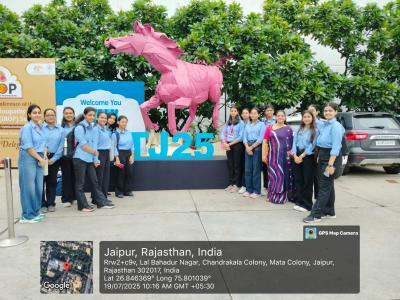Talk Journalism 2025 – 9th Edition

IIS (Deemed to be University), Jaipur
Name of the Department: Department of Journalism and Mass Communication
Name of the Event: Talk Journalism 2025 – 9th Edition
Date: July 19–20, 2025
Venue: Hotel Clarks Amer, Jaipur
Topic/Theme: Session 5- How Free Are We to Express Ourselves?
No. of Participants/Beneficiaries: UG and PG students of the Department of Journalism and Mass Communication
Name of the Activity Coordinator: Dr. Aditi Pareek and Ms. Rama Choudhary
Name of Collaborating Agency (if any): Talk Journalism, Jaipur
Objective of the Event:
The session aimed to critically examine the evolving meaning and challenges of freedom of expression in India’s digital age. It sought to highlight how responsibility, censorship, and digital influence shape democratic dialogue and public opinion.
Description (max 500 words):
The opening panel of Talk Journalism 2025 set the tone for the day with a stimulating discussion on freedom of expression. Each speaker, representing different domains of media and storytelling, offered unique insights on responsibility, dissent, and the pressures of digital influence.
- Akash Banerjee, host of The Deshbhakt, emphasized that true freedom of expression lies in standing up for others and not just oneself. He cautioned against blind loyalty and urged the audience to practice critical thinking, particularly in the age of AI-generated content.
- Gagan Chaudhary, auto-industry content creator, compared freedom of speech to auto reviews, highlighting how constructive criticism is often dismissed as negativity. He argued that truth-telling, even in niche sectors, is a form of activism that moves society forward.
- Anubhav Sinha, filmmaker known for socially conscious films like Article 15 and Thappad, shared that his filmmaking shifted when he began “looking beyond the story.” He stressed that voicing discomfort or pointing out the wrong is not divisive but the first step toward finding what is right.
The panel collectively reinforced that expression refines thought and dialogue is central to democracy.
Key Takeaways:
- Freedom of expression requires responsibility, awareness, and courage.
- Silence in the face of injustice is complicity.
- Expression refines thought and nurtures dialogue.
- In the AI age, skepticism and digital literacy are crucial.
- Even in niche fields, truth-telling is activism.
Outcome of the Session:
The session successfully highlighted the nuanced challenges of expressing dissent in today’s India. Students and participants gained deeper insights into the intersections of media, politics, and digital culture, leaving them with a reinforced commitment to honest, critical, and responsible communication.

